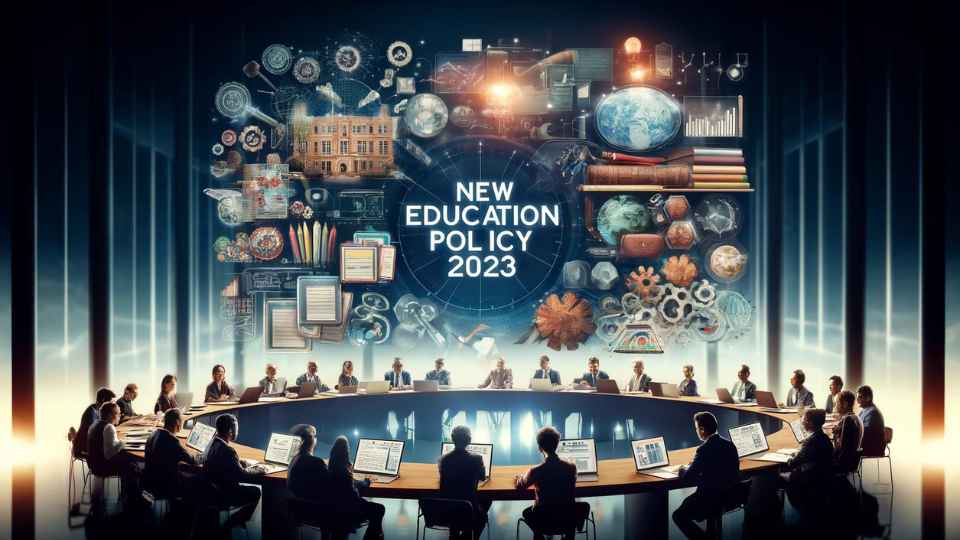Know India's New Education Policy 2023: Important Information
In 2023, the Indian government implemented the New Education Policy (NEP), a momentous step towards revolutionizing the country's educational system. This policy introduces a number of ground-breaking measures intended to modernize and rejuvenate the nation's educational framework, making it a significant turning point in the history of the Indian educational system. We will examine the main features of India's New Education Policy 2023 in this extensive guide, giving you crucial information on the goals, effects, and ramifications for preschools and educational facilities all throughout the country.

Curriculum Enhancement: Preschools will need to align their curriculum with the policy's emphasis on holistic development, critical thinking, and skill-building.
Teacher Training: Educators in preschools will benefit from the policy's focus on teacher training and development, enabling them to provide high-quality early childhood education.
Assessment Practices: Preschools will transition towards formative and competency-based assessments, reducing the stress associated with examinations.
Digital Integration: Preschools may adopt digital tools and resources to introduce young learners to technology and digital literacy and for that schools can use school parent app.
Multilingual Approach: Preschools may incorporate multilingualism by using the mother tongue or local language as a medium of instruction.
Inclusivity: Preschools will play a crucial role in fostering inclusivity by accommodating children with diverse learning needs.
Originally Published Here.
The Genesis of India's New Education Policy 2023
The New Education Policy 2023 is a result of extensive deliberations, consultations, and recommendations by experts, educators, policymakers, and stakeholders in the field of education. The primary aim of this policy is to address the evolving needs of India's education system, align it with global standards, and foster holistic development in students. It seeks to bridge the gap between traditional and modern pedagogical approaches while emphasizing inclusivity, flexibility, and innovation.Key Highlights of the New Education Policy 2023
1. Early Childhood Care and Education (ECCE):
- The NEP emphasizes the importance of ECCE by focusing on the foundational years of a child's education.
- Preschool education is recognized as a crucial stage for building a strong educational base.
- Quality early childhood education programs will be developed to ensure school readiness.
2. Reforming Curriculum and Pedagogy:
- The policy advocates for a more flexible and interdisciplinary curriculum that encourages critical thinking and problem-solving skills.
- It promotes the integration of vocational skills into mainstream education, enabling students to acquire practical knowledge.
3. Assessment Reforms:
- The NEP proposes a shift from rote learning and high-stakes exams to a more holistic and competency-based assessment system.
- It encourages formative assessments and a reduction in the emphasis on board examinations.
4. Multilingualism and Cultural Awareness:
- The policy encourages the use of the mother tongue or local language as the medium of instruction, especially in the early years of education.
- It emphasizes the preservation and promotion of India's rich cultural heritage.
5. Teacher Training and Development:
- The NEP focuses on continuous professional development for teachers, ensuring they are well-equipped to adopt modern teaching methods.
- It introduces a four-year integrated teacher education program to enhance the quality of teacher training.
6. Digital Education:
- The policy acknowledges the role of technology in education and aims to promote digital literacy among students.
- It envisions a shift towards online and blended learning approaches.
7. Inclusivity and Special Education:
- The NEP emphasizes inclusive education for students with disabilities and aims to provide equal educational opportunities.
- Special education programs will be developed to cater to diverse learning needs.
Impact on Preschools and Early Childhood Education
India's New Education Policy 2023 recognizes the critical role of preschool education in laying a strong foundation for a child's future learning journey. As a result, preschools and early childhood education centers are expected to undergo significant changes:Curriculum Enhancement: Preschools will need to align their curriculum with the policy's emphasis on holistic development, critical thinking, and skill-building.
Teacher Training: Educators in preschools will benefit from the policy's focus on teacher training and development, enabling them to provide high-quality early childhood education.
Assessment Practices: Preschools will transition towards formative and competency-based assessments, reducing the stress associated with examinations.
Digital Integration: Preschools may adopt digital tools and resources to introduce young learners to technology and digital literacy and for that schools can use school parent app.
Multilingual Approach: Preschools may incorporate multilingualism by using the mother tongue or local language as a medium of instruction.
Inclusivity: Preschools will play a crucial role in fostering inclusivity by accommodating children with diverse learning needs.
Conclusion
India's New Education Policy 2023 is a comprehensive and ambitious reform initiative that aims to shape the future of education in the country. Its impact on preschools and early childhood education is significant, as it recognizes the critical importance of laying a strong educational foundation during the early years. Best preschools in India will need to adapt and evolve to align with the policy's objectives, ensuring that young learners receive a well-rounded, inclusive, and high-quality education that prepares them for a brighter future. As the policy is gradually implemented, its success will depend on collaborative efforts from all stakeholders, including educators, parents, and policymakers, to create an educational ecosystem that truly empowers every child in India.Originally Published Here.

Comments
Post a Comment